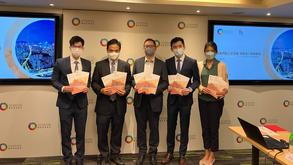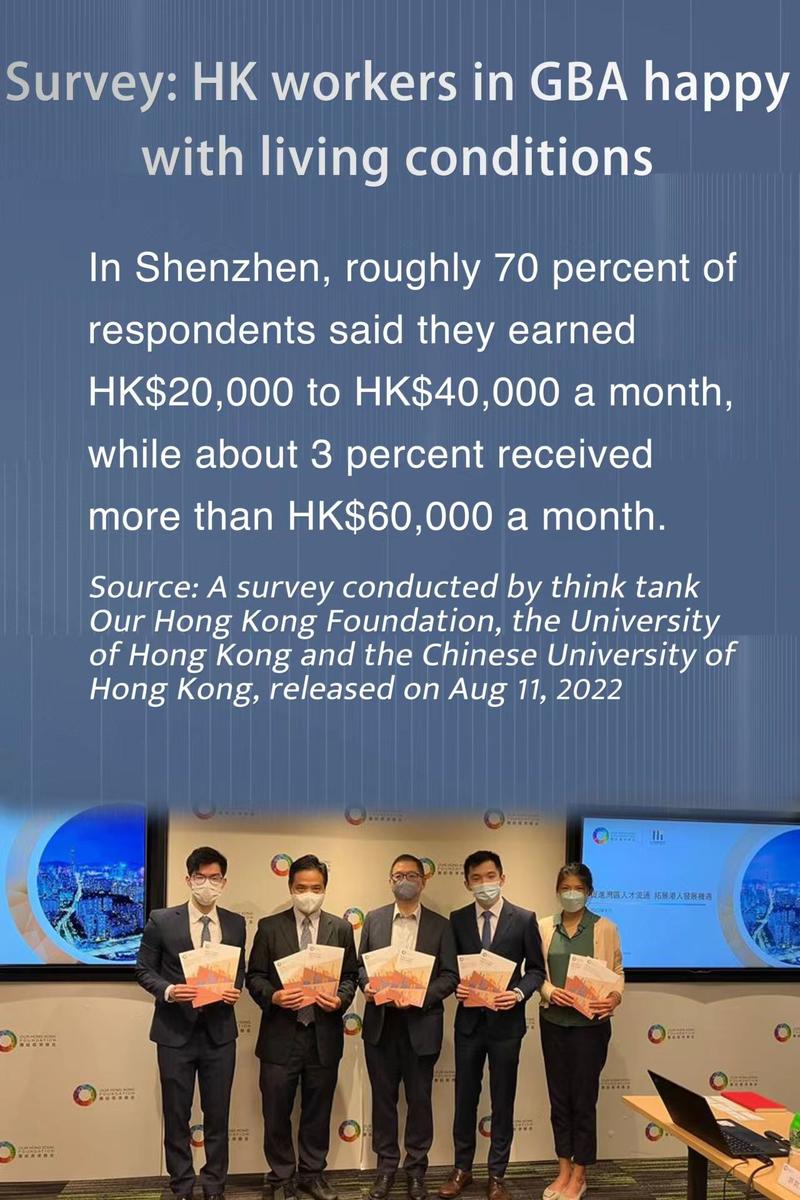 (From left) Alex Mak Wing-chung, researcher of Our Hong Kong Foundation; Stephen Wong Yuen-shan, executive director of the Public Policy Institute and senior vice president of Our Hong Kong Foundation; Eric Fong Wai-ching, chair professor in sociology at the University of Hong Kong; Victor Kwok Hoi-kit, head of education and youth research at Our Hong Kong Foundation; and Keira Wang Pinqiao, research assistant of Our Hong Kong Foundation, pose for a group photo during a news conference in which the foundation released the results of three surveys. (PHOTO PROVIDED TO CHINA DAILY)
(From left) Alex Mak Wing-chung, researcher of Our Hong Kong Foundation; Stephen Wong Yuen-shan, executive director of the Public Policy Institute and senior vice president of Our Hong Kong Foundation; Eric Fong Wai-ching, chair professor in sociology at the University of Hong Kong; Victor Kwok Hoi-kit, head of education and youth research at Our Hong Kong Foundation; and Keira Wang Pinqiao, research assistant of Our Hong Kong Foundation, pose for a group photo during a news conference in which the foundation released the results of three surveys. (PHOTO PROVIDED TO CHINA DAILY)
More than half of Hong Kong residents working in the mainland cities of the Guangdong-Hong Kong-Macao Greater Bay Area are satisfied with their living conditions as they have a relatively high socioeconomic status and good earnings, a survey released on Thursday showed.
The survey interviewed 2,499 Hong Kong people who have worked for at least two weeks per month in the nine mainland cities of the Greater Bay Area — Guangzhou, Shenzhen, Zhuhai, Foshan, Huizhou, Dongguan, Zhongshan, Jiangmen and Zhaoqing.
The survey interviewed 2,499 Hong Kong people who have worked for at least two weeks per month in the nine mainland cities of the Greater Bay Area — Guangzhou, Shenzhen, Zhuhai, Foshan, Huizhou, Dongguan, Zhongshan, Jiangmen and Zhaoqing
Local think tank Our Hong Kong Foundation collaborated with the University of Hong Kong and the Chinese University of Hong Kong to conduct the survey from November 2020 to April 2022.
According to the survey, the average respective scores of respondents’ socioeconomic status, on a scale of 1 to 10, increased from 4.65 in Hong Kong to 5.75 on the mainland. In terms of sectors of average rising scores, respondents working in the administration and support-services sector raised their scores the most, followed by those in the food and accommodation services as well as public-administration sectors.
ALSO READ: Survey: Over 70% of HK people keen on GBA opportunities
For Hong Kong talent working in nontraditional advantage industries, the Greater Bay Area can provide more room for development and an alternative path of upward mobility, the survey said.
The income of survey participants is similar to or better than that of Hong Kong residents, with the monthly median salary reaching HK$18,700 ($2,387). In Shenzhen, roughly 70 percent of respondents said they earned HK$20,000 to HK$40,000 a month, while about 3 percent received more than HK$60,000 a month.
Eric Fong Wai-ching, one of the leaders of the survey and chair professor in sociology at HKU, said Hong Kong people with strong professional networks on the mainland are more likely to work in mainland cities of the Greater Bay Area.
About 85 percent of the respondents said medical services is one of the most important factors when choosing which mainland city of the Greater Bay Area to settle in. However, more than 67 percent were dissatisfied with or neutral about mainland healthcare services.
The survey noted that in recent years, the central government has introduced about 40 policies regarding housing and entrepreneurship to facilitate Hong Kong residents’ development in the Greater Bay Area, but about half of respondents were unfamiliar with the policies.
ALSO READ: Retired headmaster encourages youth to chase dreams in GBA

The Hong Kong government should encourage Hong Kong young people to gain mainland experience at an earlier stage, and strengthen support for associations of Hong Kong residents so they can serve as a bridge between the government and residents in policy understandings, the survey concluded.
Our Hong Kong Foundation also released another two surveys about Hong Kong residents’ views on foreigners and mainland residents coming to work and study in the city as well as the central government’s support for Hong Kong during the pandemic, along with the development intentions of highly educated mainland professionals residing in Hong Kong.
The former showed 66 percent of Hong Kong people agreed that nonlocal recruitment was inevitable in globalization, while more than half said recruitment of highly educated mainland professionals had positive effects on relieving local manpower shortages and promoting the development of emerging sectors.
Our Hong Kong Foundation commissioned Lingnan University to interview 1,025 Hong Kong permanent residents aged 18 or above in April. In that survey, over 77 percent appreciated the central government’s caring about Hong Kong during the fifth wave of the COVID-19 pandemic.
READ MORE: GBA 'best entry point' for HK to integrate into nation's plan
The latter survey showed about 60 percent of highly educated mainland respondents in Hong Kong with an employment visa did not intend to stay more than five years, mainly because of poor living conditions. The survey covers 3,012 mainland people in Hong Kong from February 2019 to May 2020.
Victor Kwok Hoi-kit, head of education and youth research at Our Hong Kong Foundation, said that talent mobility is the primary condition of the regional coordinated growth. “The (Hong Kong) government should take a multipronged approach, from visa, living environment, and medical treatment to community integration, to boost the coordinated development of the Greater Bay Area,” he said.
tianyuanzhang@chinadailyhk.com


